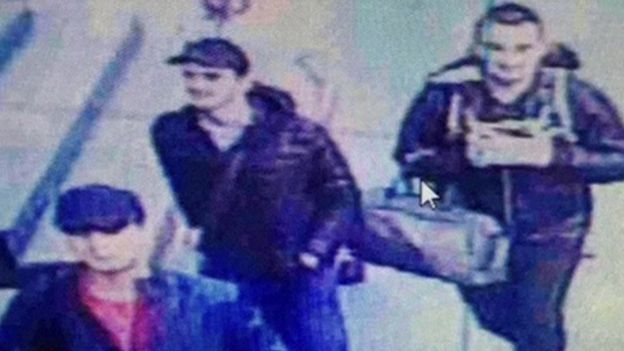Istanbul airport attackers ‘Russian, Uzbek and Kyrgyz’

The three men who carried out Tuesday's deadly attack on an Istanbul airport were all from parts of the former USSR, Turkish sources say.
One is said to be from Russia's North Caucasus region and the others from Uzbekistan and Kyrgyzstan.
Turkey believes so-called Islamic State (IS) was behind the suicide gun and bomb attack that left 43 people dead and 230 injured at Ataturk airport.
Police detained at least 13 suspects in Istanbul and more in Izmir on Thursday.
More details of the victims have emerged, many of them airport workers.
One image on Turkish media purported to show the three men together at the airport moments before the attack, wearing dark jackets and carrying holdalls. Two are wearing caps, one is smiling.
An unnamed Turkish official confirmed for Reuters news agency the dead attackers' countries of origin after Turkish media reports.
Some agencies named one of the men as Osman Vadinov, said to have crossed into Turkey from the IS stronghold of Raqqa in Syria in 2015.
Reports that he was a Chechen have been denied by an unnamed police source in the North Caucasus, Russia's Interfax news agency reports.
The organiser of the attack has been named by Turkish media as Akhmed Chatayev, a Chechen believed to have acted as an IS recruiter, who is on a US counter-terror sanctions list. His fate was not immediately clear.
IS has long recruited members from mainly Muslim parts of the former USSR, with Russian President Vladimir Putin putting the overall number at between 5,000 and 7,000 in October.
The government has made no official statement on nationalities yet and no-one has said they carried out the attack on Tuesday evening.
Turkish Prime Minister Binali Yildirim said on Wednesday that "our thoughts on those responsible for the attack lean towards Islamic State".
Meanwhile, another Turkish official told AFP news agency: "Earlier today, the police raided 16 locations to detain 13 IS suspects, including three foreign nationals."
Turkish media said counter-terrorism police had raided several areas of Istanbul — including Pendik, Basaksehir and Sultanbeyli.
Arrests were also reported in the western coastal city of Izmir, where at least nine people were detained, accused of financing, recruiting and providing logistical support to IS.
Separately, Turkish media reported that security forces had killed two suspected IS militants on the Syrian border last Saturday. They said one had been planning an attack on the capital Ankara or the city of Adana.
Nationality of dead so far confirmed (may include dual nationality)
24 — Turkish
6 — Saudi
2 — Iraqi
1 — Chinese; Jordanian; Tunisian; Uzbek; Iranian; Ukrainian; (Palestinian ambassador to Turkey says one Palestinian woman killed)
Detailing the attack, Mr Yildirim said the three men had wanted to pass through the security system but on seeing the controls "took their weapons out of their suitcases and opened fire at random at the security check".
One attacker detonated his explosives downstairs in the arrivals terminal, Turkish officials said.
The second went upstairs and set off his explosives there while the third waited outside as passengers fled. He then detonated his explosives, causing the most casualties.
A Kalashnikov assault rifle, a handgun and two grenades were found on the bodies, Turkish media said.
The death toll has now risen to 43 — 19 of them foreign nationals or of dual nationality. More than 230 people were injured, dozens of whom remain in critical condition in hospital.
Dozens of anxious friends and relatives remain camped outside Istanbul's Bakirkoy hospital, waiting for news.
The victims
Funerals of some of the victims began on Wednesday, including Muhammed Eymen Demirci, who landed a job on the ground services crew in May after a year unemployed, texting a friend saying "I got the job bro!"
He died waiting for a bus.
Tunisian doctor Fathi Bayoudh had reportedly been in Turkey for some weeks trying to secure the release of his son, who had been detained for allegedly joining IS.
Marvan Melhim and his wife, Nisreen, both work in Saudi Arabia, and had arrived with their three-year-old daughter.
"We heard shooting from a distance," said Marvan. "The explosion went off. I found my wife bleeding and my daughter too." Nisreen died in hospital shortly afterwards.
A friend of Serkan Turk said the physical education teacher had rushed to the site of the first explosion to help the wounded, but was killed by a later blast.
Ataturk airport
Europe's third-busiest in passenger traffic after London Heathrow and Paris Charles de Gaulle, serving 61.3 million passengers in 2015. World's 11th busiest
Opened in 1924 in the Yesilkoy area, renamed in the 1980s after the nation's first president, Mustafa Kemal Ataturk
Two passenger terminals: one domestic, one international
To be closed after the massive Istanbul New Airport — planned to be the largest in the world — opens in the Arnavutkoy district. Its first phase is due to be operational in 2017
Major attacks
2016
28 June, Istanbul: Suicide attackers kill 43 people and injured 240 in gun and bomb attack on Istanbul's Ataturk airport
13 March, Ankara: Car bomb kills 35. Claimed by Kurdish militant group TAK
17 February, Ankara: 29 killed in attack on military buses. Claimed by TAK
12 January, Istanbul: 12 Germans killed by Syrian bomber in tourist area
2015
23 December, Istanbul: Bomb kills cleaner at Istanbul's Sabiha Gokcen airport. Claimed by TAK
10 October, Ankara: More than 100 killed at peace rally outside railway station. Blamed on IS
20 July, Suruc, near Syrian border: 34 people killed in bombing in Kurdish town. IS blamed
Политика конфиденциальности | Правила пользования сайтом











